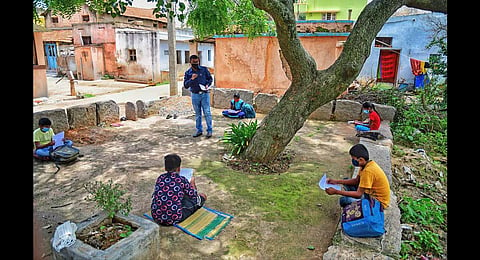

BENGALURU: The state government’s Vidyagama programme, which enabled continued schooling to government schoolchildren by teachers visiting their vicinities, came to an abrupt end on Saturday, albeit temporarily.The programme drew over 90,000 from private schools to government ones, but eventually had to come to a close due to heavy lobbying by teachers and private schools at the cost of thousands of students, said a top official from the education department on condition of anonymity.“With some checks in place, the programme would have been a complete success. However, with the Teachers constituency elections round the corner, the government and the private teachers’ lobby has managed to do away with the programme,” said the official.
Education expert Dr Niranjanaradhya V P said that stopping Vidyagama could prove detrimental to children from the economically lower sections whose families have been affected by the pandemic. Government schools provide education and also act as a nurturing centre, providing milk, mid-day meals, health checks etc, he said.“This is not a good sign. The minimum support for these children has been taken away. Children form about 37% of the state’s population and those affected by Covid-19 are less than 1%. I urge the Chief Minister and the Education Minister to restart the programme,” he said.
“The percentage of SC, ST, OBC students in government schools is huge, and the state’s decision is less about the marginalised students being exposed to the virus and more about the idea of pushing them back to caste-based occupations (by denying them education),” said Cynthia Stephen, a social policy researcher.